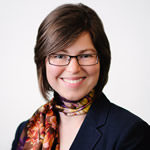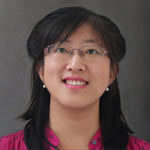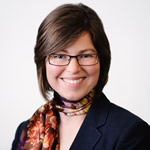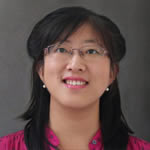The first day of the Exchange successfully concluded. Recordings of the presentations, plus the presenters’ slides and a transcription of the presentations are available on the Exchange website. We encourage you to continue the conversation with the presenters by submitting comments and questions to their presentation pages on the website. Additionally, you’re encouraged to use the Twitter backchannel #ALLExchange to interact with other participants throughout the conference. The Exchange website features a Twitter feed to keep everyone informed. Day 2 continues on Wednesday, May 6, at noon EDT. Each day will conclude with a summary of the day’s events. The following summary is provided courtesy of Exchange Working Group member Narine Bournoutian.
Exchange Day 1: May 4, 2020. Leadership and Change Management
Keynote: Making Power, Making Change: presented by Emily Drabinski
Drabinski emphasized the importance of building power collectively to make the change that we want both in our institutions and the world. This topic is especially relevant in the current pandemic: what power vacuums are now opening up? Librarians should be aware of the power built into library infrastructures; the systems we build determine what’s done within them and how the power flows. This applies to many systems within libraries, which means that many of us do have some ability to determine the flow of power within our libraries, even when it seems like we may have none. One example cited was the LC classification system, which can set up a narrative of power- -what is worthy of classification or set up as the default narrative?
Emily noted that power is contingent and contextual, relative to a demand, and shared/collective (which is the essential principle behind union activity within libraries). She shared her experience as a locked out faculty member at previous position and how it helped her learn how to build power collectively, particularly in a union environment. She stated that solidarity can take many different forms, including the less visible organization on the backend that’s essential for public organization and overall change to occur. Finally, Emily pointed out that unions are good structured systems to leverage collective power, but not the only method to do so. She recommended getting to know everyone in your organization and having the ability to collaborate and mobilize collectively, particularly in a non-union environment.
Managing Change from The Inside-Out: The Library as Catalyst for Transformational Change: presented by Cinthya Ippoliti
Ippoliti’s presentation focused on transformational change as defined by Jean Bartunek: one where there’s a shift in organizational attitudes, beliefs, and values. Reframing often requires new information and perspectives, which can lead to conflicts and contradictory ideas within an institution. She highlighted different kinds of leadership, but recommended the concept of inclusive leadership, which focuses on diversity, curiosity, intelligence, being impartial about one's institution, holding others and oneself accountable, and being open to collaboration.
Cinthya noted that administration and institutional leaders must establish trust: be consistent and transparent about the organizational processes that drive change work and consider the processes themselves in detail. It’s important to show vulnerability and acknowledge mistakes when they’re made, as well as being mindful of psychological challenges to changes. One must also develop a strong infrastructure: establish guidelines, documentation, and clarify roles. Participants shared their own opinions on infrastructure challenges, including lack of staff, funding, transparency, communication, documentation. In closing, Cinthya stressed the importance of stakeholder engagement—it’s important to have stakeholders as collaborators in inclusive leadership. Leaders must be sure that they can tell their community's story authentically for an audience to understand it and to ensure that it reflects their institutional values.
Are We Ready? Including Organizational Readiness in Your Change Plan: presented by Aaron Noland
Noland’s presentation addressed extending Lewin's Change Model, which he felt has limitations due to its assumption that change is linear (which it isn't all the time). Lewin’s Change Model is a 3-step process: A) Unfreeze: emphasize the need for change while managing anxiety; B) Change: plan and implement and communicate with everyone involved; and C) Refreeze: institutionalize the changes, celebrate progress. Some of the pitfalls for successful change include lack of impetus to change, insufficient communication, lack of vision as to "why," no short term wins, claiming success before it’s done, and a lack of connecting change to organizational culture.
Aaron proposed that “readiness” should be added in as a first step in Lewin’s Change Model: one must assess the organization’s preparation for change before there’s any unfreezing. Readiness is formed by both organizational attributes and individual attributes. Ways to increase readiness included vicarious experiences, formal communication from the top down, improving organizational culture, and mastery experience with smaller scale changes. He provided examples from the James Madison University Libraries, which used low stakes annual planning to increase readiness for larger institutional change.
Culturally Responsive Public Services: presented by Sarah Copeland, Chapel Cowden, and Lu Gao
“Culturally responsive” was defined as the ability to understand and consider the different backgrounds of the people you teach or to whom are offered services. It’s an important consideration for all public facing services within the library, even if staff are not in an immediate customer service role. The presentation also touched on culturally responsive teaching for instructional librarians, which is a pedagogy that recognizes the importance of including cultural references in all aspects of learning. It’s vital that library staff recognize the importance of relationship building, self-reflection and self-education, and move beyond "cultural highlighting" in their services and collection.
It was recommended that librarians can broaden their cultural responsiveness by reading widely, completing continuing education, finding relevant facts, and listening to the concerns of all community members. Sarah, Chapel, and Lu shared a list of recommended reading for librarians to broaden their knowledge, which can be found with the presentation handouts. The presentation also emphasized that self-reflection is critical before getting to know one’s communities. They invited participants to engage in guided self-reflection and posed the following questions: what’s your cultural background and can you think of ways that it affects your approach to providing library services?
3 C’s for Leading Community Engagement Initiatives in Academic Libraries: presented by Steven Bell
Bell started his presentation by highlighting the “Town-Gown conflict” that often arises when universities take over a neighborhood and make local residents feel like outsiders, particularly in high-density urban neighborhoods. However, universities need the support of such communities for both the communities and institutions to thrive and for a positive relationship to form between these two spheres. One relevant example from Temple University was that a planned football stadium’s construction was indefinitely delayed due to protests from local residents.
Steven then went on to illustrate the three “C’s” for community engagement: A) curiosity- investigate every possible opportunity to engage with your community; B) Collaboration: be willing to take the first step and reach out to administration, community leaders, or both. This also means be willing to face rejection; C) Conviction: believe in your ideas and articulate them in ways that will gain you followers. He provided examples of two successful projects at Temple University Libraries, including an initiative to offer summer library jobs to middle school students and to help them consider libraries as an employment path. Despite initial resistance, students excelled at the work. A second community engagement project was to open computer lab hours for local community residents who lacked access to internet or computers, including staff offering tech support if needed. Steven then invited participants to share their own ideas and examples of community outreach projects or initiatives.





